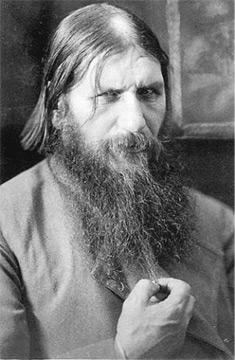A devil in the palace
By Amal Hewavissenti
He was the most influential figure in the tsarist government in
Russia at the outset of the twentieth century. His arrival in the
tsarist palace in 1907 accounted for dramatic transformations in the
state machinery of Russia and in the European history on the whole.
He became an important person just when he gained the chance to
actively involve in the official matters and particularly in the
personal matters of the members of Russian royalty. Practically all
affairs of the government were implemented with his knowledge and all
posts and appointments were given under his recommendation.
During the reign of Nicholas tsar, he obtained bribes from varied
persons for getting things performed by the king to the advantage of the
respective persons. He had a special calibre to shape the views and the
decisions of the queen (tsarina) who often influenced the king to act on
hers.
|

Grigori Rasputin |
Grigori Rasputin, in the mould of many other pseudo-intellectual
priests, appeared as a priest with long hair which brought him to a
speedy popularity and fame in Russia during Nicholas tsar's reign.
Rasputin began to place himself in the lap of luxury through his own
corrupt practices which often went unnoticed by believing crowd and
members of Russian royalty.
His personal figure with long hair and his persuasive speech made him
a "real priest" in the blissful ignorance of the public.
Grigori Rasputin grabbed the first opportunity to enter tsarist
palace when the "long haired priest" was called to cure an illness in
Prince" Sarevich, the son of king Nicholas tsar. The tsar had known him
to be an ascetic with unusual curative powers because he had managed,
through the queen, to make the tsar believe in his power. The ill
condition in the prince Sorevich gradually showed signs of abating. This
instantly turned Rasputin into an ascetic with divine powers, in the
very personal view of the tsar, queen and the public.
Banquets
For several years, Rasputin remained the symbol of power in the
tsarist palace and was looked upon as the key figure in royal banquets,
and state ceremonies - more powerful than any of the royal family. Yet,
none had the mettle to rise against him because by now, Rasputin was so
powerful that the king and the queen felt compelled to act on his words.
Nicholas tsar's own indiscretions led Russia further into confusion
and risked state duties and persons. Being the sole counsellor and
friend of Nicholas tsar, Grigori Rasputin maintained a position in the
palace which could under no circumstances be challenged by any nobleman
or member of royal family. This was because he was ever prepared to act
to the perfect satisfaction of the queen and he was the queen's
favourite.
Once, some noblemen and members of the royal family added poison to
his food to kill him but he remained unharmed because he had accustomed
his body to it.
The noblemen and the royal family in the tsarist palace could do
nothing more than being onlookers to his increasing corruption and
malpractices. His influence in the palace was underpinned by the
widespread belief that he possessed a divine and curative power within
him.
Even though he was dispelled to Siberia, the czarina made
arrangements to fetch him back to the tsarist palace in Russia.
Ultimately, prince Usupov established a friendship with Rasputin to
create an effective ground to kill him secretly. Accordingly Rasputin
was invited to a grand banquet at Usupov's palace. Rasputin was a great
lover of cakes and wine. Prince Usupov told him that his wife (Princess
Irena) was awaiting him in the palace with delectable cakes made by her
especially for Rasputin.
The cakes injected with poison were served to Rasputin at Usupov's
palace. And within seconds, Rasputin enjoyed the cakes and wine which
were mixed with cynide.
Intoxication
After a few minutes Rasputin exhibited signs of intoxication and
insisted on seeing Princess Irena who was said to be listening to music
upstairs but was actually staying in the king's palace in Cremea. Lord
Demitri, Physician Puriscovich and Prince Usupov instantly decided to
escape from him because they knew that Rasputin would have killed them
had he sensed their conspiracy to kill him.
Prince Usupov shot him from behind. Intoxicated Rasputin fell flat on
the floor.
A little while later prince Usupov and the group approached him to
check whether he was dead. As they were looking on the supposedly dead
body, Rasputin lying in the pool of blood, opened one eye and grabbed
Prince Usupov in the neck.
As Usupov was struggling to free himself from Rasputin's grip,
Dimitri and Puriscovich shot Rasputin in several places till he
collapsed.
Prince Usupov and others hurled the 'dead body' on to a cold river.
After a few days, the police discovered the body of Rasputin which was
identified by his daughter Maria. The conclusion of the post mortem
investigation was that Gregory Rasputin had died because extremely cold
water had entered his lungs.
The funeral rites to Rasputin's body were performed in a Church and
the tsar paid his last respects to the body. He deeply condemned the
killing of a "great man" and ordered to arrest Usupov who by then had
fled the country. The 1917 Russian revolution ousted tsarist regime
which had sunk into the depths of popularity on account of Rasputin's
malpractices. |

